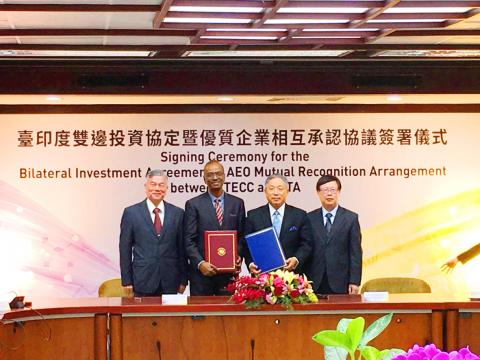Taiwan and India yesterday signed a new bilateral investment agreement (BIA) and a treaty to mutually recognize respective authorized economic operation (AEO) programs, the Ministry of Foreign Affairs said, touting them as major achievements in the government’s New Southbound Policy.
The pacts were inked by Representative to India Tien Chung-kwang (田中光) and India-Taipei Association Director-General Sridharan Madhusudhanan, and witnessed by Minister of Economic Affairs Shen Jong-chin (沈榮津) and Deputy Minister of Finance Wu Tzu-hsin (吳自心) in Taipei.
While Taiwan and India had signed a BIA in 2002, which came into effect in 2005, a new agreement was signed to update it and ensure that Taiwanese businesspeople’s investments in India are treated in line with international standards, ministry Department of East Asian and Pacific Affairs Deputy Director-General Fan Hui-chun (范惠君) told a news conference in Taipei.

Photo: CNA
Given the expanding range of information and communication technology (ICT) investments, the BIA was revised after referencing the latest international investment agreements, Fan said.
“We believe [the new BIA] would help boost bilateral investments and be conducive to Taiwan’s ICT industry’s expansion to India,” Fan said, adding that the agreement includes indirect investments made by Taiwanese businesspeople from places like Vietnam and Singapore.
As the BIA is patterned after international standards, future business disputes will be dealt with by an impartial third party, sparing Taiwanese businesspeople the lengthy process of setting disputes in India’s legal system as they had to in the past, she said.
With regard to the AEO Mutual Recognition Agreement, Fan said that as India is one of Taiwan’s top 20 trading partners, the two nations have signed a customs mutual assistance agreement, a temporary admission pact, or ATA carnet, and an action plan to develop mutual recognition of AEO programs.
“Taiwan and Australia also have an AEO mutual recognition agreement that allows businesses from both sides to enjoy expedited customs clearance, which should help increase their competitiveness,” Fan said.
The signing of the two pacts not only lays a more solid foundation for deeper relations between Taiwan and India, but also opens a new page in trade and economic cooperation, she said.

A preclearance service to facilitate entry for people traveling to select airports in Japan would be available from Thursday next week to Feb. 25 at Taiwan Taoyuan International Airport, Taoyuan International Airport Corp (TIAC) said on Tuesday. The service was first made available to Taiwanese travelers throughout the winter vacation of 2024 and during the Lunar New Year holiday. In addition to flights to the Japanese cities of Hakodate, Asahikawa, Akita, Sendai, Niigata, Okayama, Takamatsu, Kumamoto and Kagoshima, the service would be available to travelers to Kobe and Oita. The service can be accessed by passengers of 15 flight routes operated by

MORE FALL: An investigation into one of Xi’s key cronies, part of a broader ‘anti-corruption’ drive, indicates that he might have a deep distrust in the military, an expert said China’s latest military purge underscores systemic risks in its shift from collective leadership to sole rule under Chinese President Xi Jinping (習近平), and could disrupt its chain of command and military capabilities, a national security official said yesterday. If decisionmaking within the Chinese Communist Party has become “irrational” under one-man rule, the Taiwan Strait and the regional situation must be approached with extreme caution, given unforeseen risks, they added. The anonymous official made the remarks as China’s Central Military Commission Vice Chairman Zhang Youxia (張又俠) and Joint Staff Department Chief of Staff Liu Zhenli (劉振立) were reportedly being investigated for suspected “serious

ENHANCING EFFICIENCY: The apron can accommodate 16 airplanes overnight at Taoyuan airport while work on the third runway continues, the transport minister said A new temporary overnight parking apron at Taiwan Taoyuan International Airport is to start operating on Friday next week to boost operational efficiency while the third runway is being constructed, the Ministry of Transportation and Communications said yesterday. The apron — one of the crucial projects in the construction of the third runway — can accommodate 16 aircraft overnight at the nation’s largest international airport, Minister of Transportation and Communications Chen Shih-kai (陳世凱) told reporters while inspecting the new facility yesterday morning. Aside from providing the airport operator with greater flexibility in aircraft parking during the third runway construction,

American climber Alex Honnold is to attempt a free climb of Taipei 101 today at 9am, with traffic closures around the skyscraper. To accommodate the climb attempt and filming, the Taipei Department of Transportation said traffic controls would be enforced around the Taipei 101 area. If weather conditions delay the climb, the restrictions would be pushed back to tomorrow. Traffic controls would be in place today from 7am to 11am around the Taipei 101 area, the department said. Songzhi Road would be fully closed in both directions between Songlian Road and Xinyi Road Sec 5, it said, adding that bidirectional traffic controls would